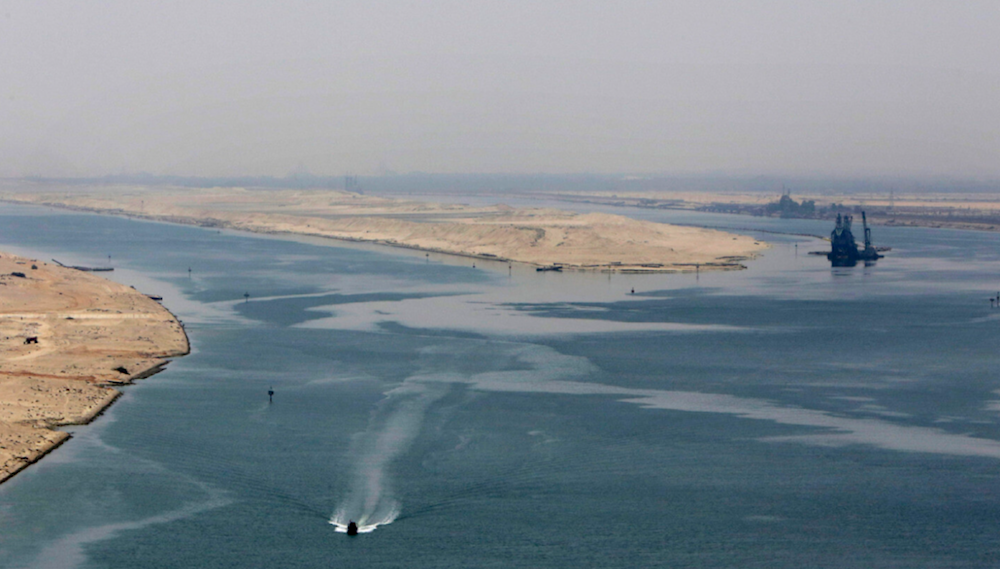Waterway crises put global trade in shambles, jeopardy: FT
Experts have warned that the Suez Canal, which connects the Mediterranean and the Red Sea, could see operations interrupted.
-

The Suez Canal near Ismailia Egypt on August 6, 2015 (AP)
The Financial Times has reported that disruptions to the Panama and Suez canals, two of the world's most important commerce waterways, are jeopardizing global supply chains.
Experts have warned that the Suez Canal, which connects the Mediterranean and the Red Sea, could see operations interrupted after the Yemeni Armed Forces announced on Sunday the introduction of a new actionable decision in support of Gaza, which will see the prohibition of all ships bound to the occupation entity, regardless of their nationality, from passing through the Arabian and Red seas until food and medicine sufficient to the needs of the population enter the besieged Strip.
In a statement, Yemeni Armed Forces Spokesperson Brigadier General Yahya Saree declared that this prohibition is "effective immediately," noting that Sanaa, "out of its commitment to the safety of maritime navigation, warns all ships and companies against dealing with Israeli ports."
This is the second such decision by the Yemeni Armed Forces in support of Palestine.
The Yemeni Armed Forces Spokesperson, Yahya Saree, announced on Sunday the group's intention to target any ships owned or operated by Israeli companies or bearing the Israeli flag. This statement, made on the group's Telegram channel, also included a call for all nations to withdraw their citizens employed in the crews of any such ships.
"We urge all countries to avoid shipping on vessels owned by Israeli companies or operated by them," he further stressed.
Implementing the first warning, the Yemeni Armed Forces captured last month the Israeli Galaxy Leader vessel in the Red Sea via a naval operation landing on its deck, before leading it to the sea off the coast of Hodeidah.
The army also successfully targeted two Israeli ships earlier this month, using a drone and missiles, while forcing several shipping vessels to reroute or entirely change course away from the Red Sea, subsequently increasing delivery periods, costs, and insurance rates.
Rolf Habben Jansen, head of German group Hapag-Lloyd, the world’s fifth-largest owner of container ships, told FT that if the passage through the Suez would become more difficult [as well], that could cause serious disruptions [to global supply chains]."
Marco Forgione, director-general of the UK’s Institute of Export and International Trade, expressed to FT that the result of such disruptions would be "catastrophic" for global trade, particularly citing that some supplies will not be available in time for Christmas.
Drought in Panama Canal
The Panama Canal, a 50-mile-long (80.5-kilometer) waterway connecting the Pacific and Atlantic seas, has been suffering from drought, which has reduced water levels and reduced the canal's transit capacity.
According to trade intelligence organization MarineTraffic, just 167 boats passed through the river this year, compared to 238 in the first week of December 2022. Several ships were forced to wait up to two weeks to cross and many ships have detoured thousands of kilometers to avoid costly delays.
Jansen called the drought a "serious concern", and the German company announced earlier that 42 of its ships would be diverted from the canal.
While the West worries about the impact the blocking of the canal would have on its holiday season, a report by the Euro-Med Human Rights Monitor shows that "Israel" has killed more than ten thousand children and infants since the onset of aggression against the Gaza Strip on the seventh of October.
As hundreds of children remain under the rubble with their chances of rescue diminishing after weeks of unsuccessful rescue attempts, the total number of child casualties will likely exceed 10,000, the Monitor added.

 4 Min Read
4 Min Read








